Obituary: Burt Kwouk, actor


Burt Kwouk was a British-Chinese actor whose more than half-century career between his first screen role in 1957 and his final parts in 2010 was dominated by Cato Fong, the manservant to Peter Sellers’ bumbling French detective Jacques Clouseau in the Pink Panther films. First introduced in the long-running series’ second instalment A Shot in the Dark (1964), Cato’s initial purpose was, as a supposed martial arts expert, to attack Clouseau unexpectedly at every opportunity, in order to keep his employer’s guard up.
In many ways it was a slim part, but on its own terms it was brilliantly played. Savagely and eagerly attacking Clouseau at the most inopportune moments, stopping mid-scrap to answer the phone and taking deadpan off-guard hits from Sellers’ character to end the fight in unfair style, Kwouk kept pace with the stuntwork involved even as he matched the acknowledged comedy genius Sellers for straight-laced slapstick mayhem.
Advertisement
Hide AdAdvertisement
Hide AdKwouk appeared as Cato in all but two of the original nine Pink Panther movies shot between 1963 and 1993, missing out on 1963’s original and 1968’s Alan Arkin-starring reboot of sorts Inspector Clouseau. Of the seven movies in the series in which he did appear, all were directed by its creator Blake Edwards and five starred Sellers, including 1982’s much-derided posthumous effort Trial of the Pink Panther. Later entries Curse of the Pink Panther (1983, with Roger Moore in cameo as Clouseau) and Son of the Pink Panther (1993, an attempted reboot with Roberto Benigni in the title role) were also critical and commercial failures.
Invited to meet Edwards at the Dorchester Hotel, Kwouk was offered the part of Cato two weeks later by phone, without having to audition for it. In later years he seemed to accept that the role had typecast him for the most part throughout his career, but he never seemed to resent that fact, as many other performers might. “An actor sometimes gets fed up with being identified with a role he did for a very short time,” he said in interview for the Cinema Museum. “You think, ‘hey, I did more than that.’ But no, it’s fashionable for actors to say ‘I don’t like attention.’ Come on - we become actors because we’re seeking attention.”
In light of the above, Kwouk’s many other credits might perhaps tend to go unfairly unnoticed. He appeared in different roles in three early James Bond films, Goldfinger (1964), You Only Live Twice (1967) and the Sellers-starring spoof Casino Royale (also 1967); in Hollywood features as diverse as the dystopian sports thriller Rollerball (1975) and Stephen Spielberg’s JG Ballard adaptation Empire of the Sun (1987); and in classic television series including Hancock’s Half Hour, The Avengers, The Saint and in a significant and well-received role in the BBC’s WWII prisoner of war drama Tenko.
He was an alumnus of that staple proving ground for British actors, Doctor Who (appearing in Peter Davison’s first story as the Doctor in 1982 and an audio adventure in 2001), and although his typically hard-working presence on mainly British television screens never went away, he enjoyed something of a revival as he approached the final decade of his career. Between 1997 and 2000 he was a regular on The Harry Hill Show, from 2001 to 2004 he provided the martial arts-style voiceover for spoof Japanese gameshow Banzai, and starting in 2002 he began an eight-year stint as the electrician Entwistle, a regular part in Last of the Summer Wine which was written for him. There were also roles in prime-time shows like Lovejoy, Silent Witness and Judge John Deed.
Born Herbert W. Kwouk in 1930 in Warrington, England, an industrial town between Manchester and Liverpool, Kwouk was taken to live in Shanghai by his parents when he was a year old and remained there until he finished school at the age of 17, when the family returned to England. He moved to America for some years to study politics and economics at the private liberal arts establishment Bowdoin College in Brunswick, Maine, and with the family’s savings having been lost in the Chinese revolution of 1949, he has said he was “nagged” by a girlfriend into taking up acting.
His first screen appearance was in the Peter Finch-starring film Windom’s Way (1957), set during the Malayan Emergency, and he quickly followed that up with a role in the acclaimed The Inn of the Sixth Happiness (1968) starring Ingrid Bergman, about the Chinese missionary Gladys Aylward; Kwouk later said it was his most fondly-remembered part, because it was his first significant screen credit. He also took parts in action thrillers like Hammer’s The Terror of the Tongs (1961).
At a time when racial sensitivities aren’t what they are now, for much of his career Kwouk was called upon to play stock Asian characters, in some cases in scenarios which might now be considered racist. Yet that he filled so many roles and worked with so many greats is testament to nothing but his persuasive skill as an actor, combining an energy and a debonair charm which played well alongside performers such as Sellers and Moore. “I look at it this way,” he said in 1981, “if I don’t do it, someone else will. So why don’t I go in, get some money, and try to elevate it a bit, if I can?”
Particularly in his elder years, Kwouk’s voice alone retained a dignified, iconic charm, and as a voiceover artist for commercials, he was in demand. In another time he might easily have been remembered as a leading man, rather than a sidekick, but as it stands he left behind a voluminous body of work to be pleased with.
Married to Caroline since 1961 and with a son named Christopher, Burt Kwouk was awarded an OBE for services to drama in 2011. According to his agent when announcing the news, his death was peaceful.